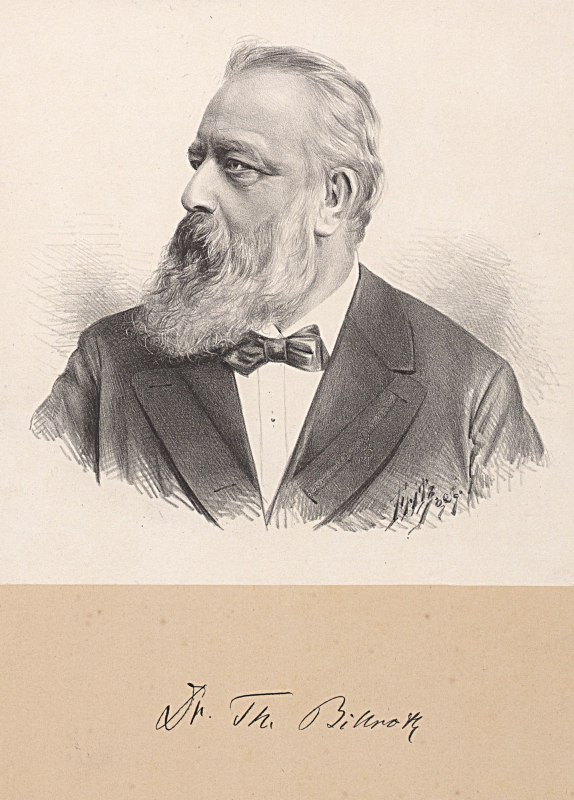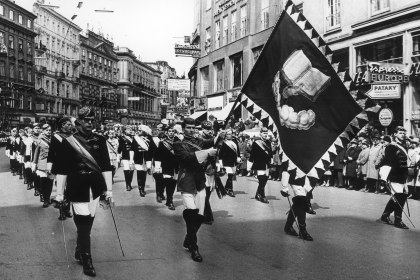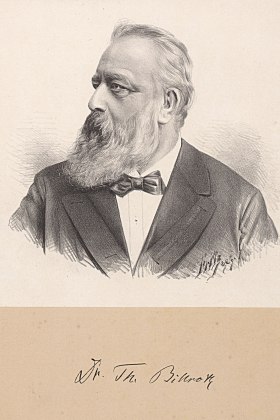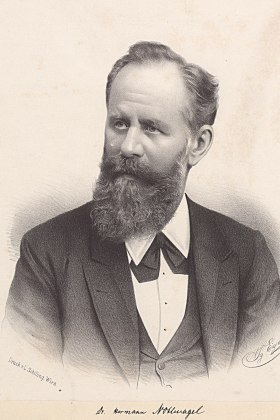“Furor teutonicus and racial hate”
In 1867 renowned surgeon Theodor Billroth was appointed to the Second Surgical Clinic of the University of Vienna. His school of surgery became a center of excellence of “German” surgery, represented by the “German” elite. Billroth distanced himself from others who, according to him, did not belong to the German cultural nation. In a culture-critical study, he criticized the Austrian government’s resistance to reform, which permitted an influx of “eastern Jewish” medical students. He demanded a numerus clausus for the study of medicine, which would discriminate against Jewish students. This led to debates in the Imperial Council, criticism from the “Jewish” middle class, and confrontations between “German” and “Jewish” students in the lecture halls. German student associations began excluding Jews based on Billroth’s assessment of them being “a clearly distinct nation; Jews who purely by accident speak German and coincidentally were raised in Germany”.
Ambassador of “German” science – leadership claims and nationalism
On October 11, 1867,Theodor Billroth held his first lecture at the University of Vienna. His goal was to reform the Vienna Medical School based on the German university system. He asked the students to trust his “leadership”, since he knew “the path from theory to practice”. During his medical studies in Greifswald, Göttingen and Berlin he had lived in humble surroundings. In his pursuit of social mobility and with huge effort, Billroth had developed into an authoritarian leadership personality.
Many of his letters include emotional accounts of day-to-day experiences in multi-cultural Vienna, which became a magnet for students from the eastern crown lands while he was head of the clinic. His descriptions of the resulting social, national, and educational problems of the empire’s metropolis and the university as its intellectual center are focused on a “German” elite in the arts and sciences, as well as the exclusion of all things “foreign”.
For Billroth’s students and assistants, he was the ideal image of a German. “The furor teutonicus rages in me; the German primordial man who distrusts every other nation comes out everywhere”, Billroth wrote after joining the German-French war in 1870 as an army doctor. In the opinion of medical historians, his letters between 1870 and 1875 exhibit socio-cultural aspects of Pan-Germanism. They were “German-chauvinist” and “dictated by an implacable hate of the French”.
Billroth gained high renown through sensational surgical successes. He developed a program on university reform from his experiences, and exploited the general unhappiness with the government’s educational policy, as well as the existential fear that was a result of the stock market crash of 1873, to establish a German university system. In the academic year of 1873/74 he denied all appointment suggestions from the Medical Faculty’s professorate that ranked Austrians before Germans. With a sense of mission he demanded a German leadership for the University of Vienna’s Medical Faculty in his opening lecture in 1874. Contemporary sources confirm that Billroth had known how to tactically use the discussion on university reform by forming a lobby in the German-nationalistic student sphere.
Billroth’s study and the discrimination of Jewish medical students
Encouraged by students’ admiration and challenged by the interest of the press in the conflicts at the University of Vienna, Billroth decided in 1875 to publish his reform suggestions for the study of medicine. With the cultural-historical study “Über das Lehren und Lernen der medicinischen Wissenschaften an den Universitäten der deutschen Nation” (“On the teaching and learning of medical sciences at the German universities”) he highlighted deficits in the teaching and education of doctors and at the same time offered suggestions for reform. He emphasized the importance of Germans in the sciences – their ambition, idealism and their “pursuit of knowledge”.
Whoever wanted to study medicine had to fulfill Billroth’s criteria: upbringing in a “good house”, excellent command of the German language, and high intelligence. “Eastern Jewish” students, the “unfortunately not completely exterminable weeds of the Viennese student body”, did not meet his criteria due to their heritage. Selection was supposed to separate the “German” medical elite from social climbers. Billroth blocked out the experiences from his youth in poverty and focused on the ethnicities he disliked. For him, Jews as a “clearly distinct nation” did not belong to the German cultural and linguistic nation. This exclusion was justified biologistically with the “gulf between pure German and pure Jewish blood”.
Thus, Billroth included the reasoning of modern, racially based anti-Semitism that stood for the strict separation between the “races”. With Billroth as a physician using this bio-politic rhetoric, he helped modern anti-Semitism to gain scientific respectability. In this way, Billroth mobilized “German” medical students against the growing competition of their “Jewish” colleagues.
Reactions of the Jewish middle class and German-nationalistic student associations
Jurist Ferdinand Horn detailed in an open letter to Billroth why he would not let himself be made an “alien by his own fatherland”. It was not Billroth’s right, he wrote, to take away his “Jewish fellow citizens’ […] right of residence on German ground and in the German people”. Max Nordau ascribed the popularity of Billroth’s book to his incitement of “hatred against Jews”. According to Nordau, Billroth had fallen into an “unconscious slumber” in his perception of Judaism and had been exploiting prejudices that were re-emerging “like a haunting ghost”.
At the University of Vienna, Billroth’s book “Lehren und Lernen” led to a consolidation of the negative stereotype of “Jews” and to the aggravation of ethnic conflicts. On December 6, 1875, “ultra-German fraternities” welcomed Billroth to the lecture hall with cheers and thunderous applause. With calls of “pereat” and “out with Jews” they supported the famous surgeon’s anti-Semitism. For German-nationalistic students
charismatic Billroth was an object of identification, because he advocated a political rhetoric that polarized nationalistically and gave them arguments for the exclusion of “Jews”.
A “unanimously decided solidarity address” of the “Leseverein der deutschen Studenten Wiens” (“Reading group of German students in Vienna”) to Billroth was an avowal to German-nationalism. The surgeon promised the group to continue to uphold their fraternity ideals: “Vivat, Floreat, Crescat Academia Imperialis Viennensis! Decus et Gloria Austriae! Deliciae Populorum Germanorum!”. Out of the first anti-Jewish riots at the university an increasingly more radical political anti-Semitism developed. In 1877/78 the fraternities “Libertas” and “Teutonia” distanced themselves from their “Jewish” colleagues with the reasoning that “a Jew cannot be well-disposed towards Germany”. In 1878 “Libertas” introduced an “Aryan paragraph”.
In 1881 Billroth lamented the overcrowding of the lecture halls at the Medical Faculty. He demanded “German” students be favored in the allocation of vacant spots in the studies, because Germans were leading “in the areas of natural science, medicine, and surgery” and thus had reached “superiority over the other civilized peoples”. In 1882 Billroth turned down a position in Berlin, in response to which the “German” students organized a torchlight procession in his honor and presented him with a letter with two thousand signatures. In his “Aphorisms on Teaching and Learning” from 1886, Billroth called for students of the University of Vienna to have an “Austrian school graduation certificate”.
The “Billroth affair” created a university-political process with its own dynamic, which influenced the political actions of future generations. Through the increasing nationalism and anti-Semitism the university became a political laboratory of inhumanity.
Billroth as a philo-Semite?
In order to amend Billroth’s political stance in public, colleagues convinced him to financially support the Viennese “Verein zur Abwehr des Antisemitismus” (“Association for the Defense against anti-Semitism”). The surgeon agreed, because the “Viennese Jews” had “valiantly helped” him to finance the construction of the “Rudolfinerhaus”. On March 17, 1893, Billroth became an honorary member of the association. Often, this acknowledgement of the sponsor is interpreted as proof of a philo-Semitic attitude, but he was neither a founding member, as some claimed, nor even a regular member. Billroth’s xenophobia is ignored, because he both had “Jewish” assistants and “Jewish” friends. He himself explained the compatibility of xenophobia and tolerance with the example of “hatred of the French”: “Due to my profession, I am forced to help people regardless of race. The kindness of some Frenchmen can be consolidated rather well with racial hate. For what other reason would our brain, our religion, and our morals have so many twists and turns?”
Articles
- Anti-Semitism at the University of Vienna
- “Furor teutonicus and racial hate”
- Student corporations in the 19th and 20th century
- The “Bärenhöhle” – a secret anti-Semitic group of professors in the inter-war period
- The Gleispach’sche Studentenordnung (Gleispach Student Regulation)
- Terror against the Anatomical Institute of Julius Tandler
- Expulsion of teachers and students in 1938
- The de-Nazification of the professorate at the University of Vienna
Last edited: 03/04/24
-
Student corporations in the 19th and 20th century
19th Cent.–20th Cent.




